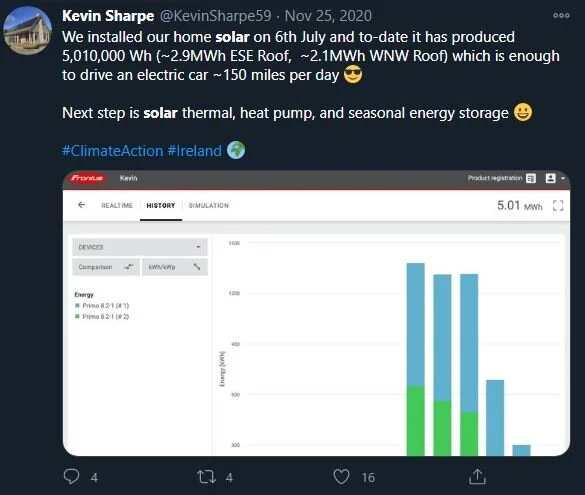
Ireland Approves Sale Of Renewable Energy To Grid
Long Awaited Move Could Be Catalyst For Renewable Energy Adoption
The Irish government has today announced that it will allow excess energy produced by renewable sources to be sold back to the grid, presenting an opportunity for those with solar panels and other forms of renewable energy production to profit from their investment.
The Microgeneration Support Scheme, which is set to launch by July 2021, follows in the footsteps of many other European nations who have seen the benefits of such an approach for many years.
Doing More With Less
This is the mantra that we need to always consider in the fight against the Climate Crisis: to do more with less.
Today’s announcement will mean that less energy produced from renewable sources is wasted – at present those with solar panels or mini wind turbines need to invest in batteries to store excess energy and save it for when they need it most.
Otherwise the energy is lost when not used or stored.
While this is creating a new circular economy that turns used EV car batteries into home storage, this can be expensive for people making their first forays into renewable energy generation.
However, by selling excess renewable energy back to the grid, it will mean that people individuals can recoup some of the money they invested in their solar array (or other form of renewable energy), and perhaps even look to reinvest it in more solar panels and battery storage.
This also has wider implications for Ireland’s energy consumption, as it will allow the Grid to draw on a wider range of renewable sources to meet the times of greatest demand. While this won’t slow the rate of investment in large-scale wind farms, it will help to reduce the reliance on fossil fuels during peak hours, while also helping to localise the grid and provide greater energy security.
The Energy industry accounts of some of the highest emission rates in Ireland. Credit: CIE
This will be critical in meeting the country’s target of renewable energy accounting for 70% of the Grid by 2030.
Energy Poverty & Fairer Access
Solar panels have never been cheaper or more accessible, with the average price of solar panels falling by 86% between 2010-2019, according to the IEA.
This is allowing more people than ever before to install solar panels and reap the benefits of free, renewable energy to meet their electricity needs – which is vital in the fight against the Climate Crisis.
More importantly, it also has the potential to increase equality and avoid increases in energy poverty – see our previous article Averting A Clean Energy Poverty Tax – by allowing greater access to cheap energy that can also be sold back to the grid for profit, rather than leaving people vulnerable to the increasing tariffs of private energy companies.
Friend of IrishEVs, Kevin Sharpe, shows that Ireland is ripe for solar energy - with a single roof capable of powering an electric car up to 240km per day. Credit: Kevin Sharpe
This also has major implications for schools, hospitals, farms, community groups and small businesses to meet their energy needs, cut their bills, and perhaps even start to generate a new source of income.
Quoted in the Microgeneration Support Scheme launch press release, Minister for the Environment, Climate and Communications, Eamon Ryan TD, said: “This scheme will allow people and communities to become active participants in the energy transition. By producing and selling their own electricity citizens, farmers, business owners and community organisations can save on their energy costs and reduce their carbon footprint. I urge interested parties to get involved and have their say.”
The Ministry for the Environment, Climate and Communications is inviting the public to take part in a consultation on how the scheme will operate – which will run until 18th February 2021. You can find out more here.
If today’s announcement has inspired you to invest in renewable energy, you can find out more about the grants available from the SEAI to help you on your way in our Guide To Renewable Energy.
Make it stand out.
How EVs Can Support Energy Independence
Houses of any size or age can be retrofitted for solar & EV charging
Investigating Ireland’s Electricity Emissions
With CO2 emissions from electricity production currently three times higher than targeted, we investigate how Ireland can meet its 2050 carbon neutrality goal





